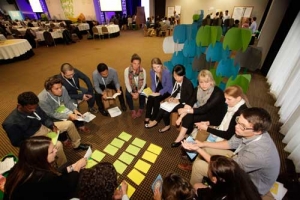Young agriculture leaders from across the world have created a global call for action to help solve the pressing issues facing agriculture and food security.
In August 100 young thought leaders, aged 18-25, from 33 nations met in Canberra as part of the Youth-Ag Summit, where they discussed the role science and modern agriculture play in feeding a hungry planet.
During the week, the delegates voted on which themes they felt were most important, those with the overall highest priority formed the basis of the Canberra Youth Ag-Declaration.
Education, communication, responsible and sustainable consumption, innovation and personal leadership all feature highly in the Declaration, which is supported by a list of solutions and actions, including:
- Developing a fair and open multi-channel platform for formal and informal educators in the agricultural industry to build greater skills
- Globally promoting and enhancing the image of farmers and the breadth of opportunities in the agricultural industry
- Enhancing socially acceptable and responsible consumption through better education and utilization of current resources
- Creating a global network that links young innovators to agricultural needs to drive information sharing, funding and solutions
- Developing a global youth platform to build a movement and develop youth leaders through mentorship and education via youth groups
The actions – which include, for example, the launch of a global agriculture awareness day – will be finalised in the coming weeks and presented to the United Nations in October.
Tobias Marchand, chair and managing director, Bayer Australia and New Zealand says the Declaration highlights the potential of youth in solving tomorrow’s biggest challenges.
“Today’s youth have the potential to solve local and global food challenges and the declaration provides a clear path for industry change. The Youth Ag-Summit in Canberra has focused on capturing the ideas of young leaders and I believe this declaration will be significant step in feeding a hungry planet.”
Laura Grubb from Australia and Samba Ouma Zablon from Kenya will present the Declaration, at the United Nation’s Committee on World Food Security in Rome in October.
Grubb, a Murdoch University honours student says the opportunity to present to the UN is significant and she believes it is rare for a conference to have such a strong outcome.
“It’s a huge opportunity; normally at conferences the information and ideas shared stay within the body of people that attended, but we have a unique opportunity to spread this around the globe to both developed and developing countries, across a range of different ecosystems, production systems, and cultures. That means we can really put the goals we’ve developed at this conference into practice and make a difference.”
During the Summit, delegates were challenged to individually develop “3 Little Things” which will see them set goals to make a difference in their home countries.
Bachelor of Commerce student Zablon says the discussion and knowledge transfer at the Youth Ag-Summit has had a big impact on him, particularly the concept of “3 Little Things”.
“My number one priority is to keep the conversation going, especially on social media because that’s where most of the young people are, that’s where we can tap the potential.
“My second priority would be to use the next four Saturday’s after the Summit, because I happen to work in a youth group in Mombasa in Kenya, to use the foresight of this to teach them, to share with them what I learnt so that I can also empower them.
“Finally, I want to work closely with the other delegate from Kenya and my country mentor, to ensure that we come up with one very awesome initiative that will bring the entire nation on-board,” he concludes.
The delegates will stay connected through the Youth Ag-Network, an exclusive online platform to help these young leaders connect, support and continue learning from each other.











